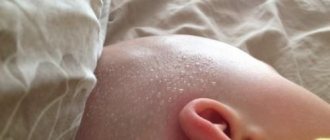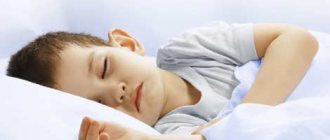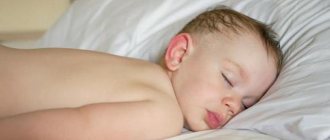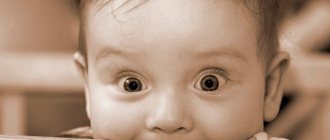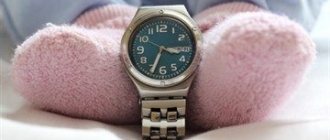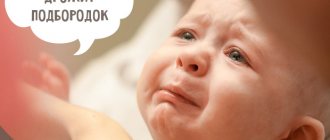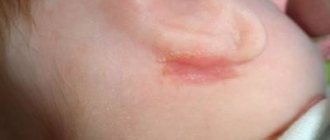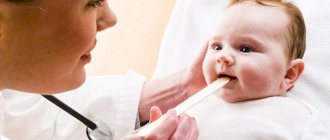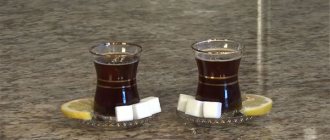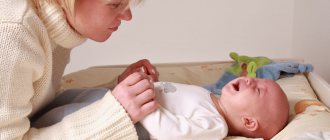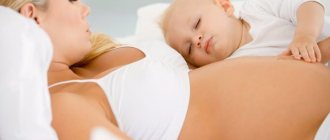Sometimes it happens that during feeding, especially if we are talking about breastfeeding, the child begins to sweat, his face turns red, and perspiration appears on his forehead. Such symptoms become a cause for concern for parents. According to doctors, a baby's head most often sweats because the child is simply tired. In rare cases, the determining factors are various disturbances in the functioning of the child’s internal organs, as well as a number of external reasons. In order not to panic in vain, you should learn as much as possible about the factors that cause a baby to sweat a lot during feeding, and ways to eliminate the problem.
Sweating of a baby's head during feeding often causes concern for parents
It happens that, after taking the baby in her arms, the mother discovers that the baby’s head is completely wet from sweat. This can happen both during rest and while awake, including during feeding. Why does this happen?
Natural causes
If a child’s head sweats during feeding, then this phenomenon is considered normal in the following cases:
- The baby has a cold. Increased sweating in this situation is quite natural and contributes to faster healing (together with sweat, waste and toxins come out of the body);
- Allergy. Low-quality fabrics from which baby clothes or bedding are made can provoke an allergic reaction, one of the manifestations of which is intense sweating on the head;
- Teething. In this case, the baby becomes restless and nervous, as a result of which his sweating increases;
- Neurosis. In situations of stress (frequent whims, prolonged crying), the child’s head may sweat, which is quite normal.
- The child is dressed too warmly. If the baby is wrapped up and a cap is put on him at normal room temperature, then the child’s body reacts to the increase in temperature by actively secreting sweat;
- It often happens that a baby sweats when eating breast milk. Sucking at the breast represents significant physical labor for the baby, on which he has to expend a lot of strength. This may cause the child to sweat;
- The reason that a baby sweats a lot when breastfeeding may be narrow milk ducts. During breastfeeding, the baby is forced to strain very hard to get enough milk. As a result, the baby's head becomes covered with sweat and his face becomes red;
- When artificial feeding, too small a hole in the bottle can lead to the same consequences;
- The child’s reaction to taking certain medications may be expressed in the form of increased sweating;
- Sweat production increases due to thick hair. Also, the cause may be synthetic fabric that does not allow air to pass through (children's bedding is often made from it).
The reasons why a baby's head sweats can be different.
Why does a baby sweat when breastfeeding?
Sweating is a natural occurrence for anyone, even if they are only a few weeks old. The process of feeding a child is quite serious work that requires a lot of effort. Therefore, it is not strange that he sweats, especially during periods of lactation crises, when there is less milk and it becomes even more difficult to obtain it.
However, there are quite a few reasons for a baby to sweat - from quite harmless to quite serious. Therefore, you should not ignore this sign. By eliminating them all one by one, you can determine whether you should worry and see a doctor or just open the window slightly.
Congenital feature
If mom or dad are prone to excessive sweating, we should expect that the newborn will also have this “ability.” In this case, there is no need to worry that the baby is sweating during feeding - if there are no other alarming signs, this is not a symptom of the disease.
The thermoregulation system in newborn babies is not adjusted immediately. Sweat glands begin to work as early as 2-3 weeks, but are fully “tuned” only by 5-6 years! Therefore, children are much more sensitive to the slightest temperature changes that are imperceptible to adults.
Hot
As logically follows from the previous paragraph, a baby can become hot even when adults feel quite comfortable.
In addition, with the birth of a child in a family, the desire to protect him from everything in the world often intensifies, so they dress him warmly, close all the windows and cracks so that the baby does not get blown out. If the house is hot, naturally the baby sweats during feeding, during sleep, and just like that. The baby is already prone to sweating when he eats breast milk, as it requires a lot of effort from him. If, at the same time, caring parents wrapped him up so that only his nose sticks out, and in the house it is +25 - it is not surprising that the baby will sweat profusely.
Dr. Komarovsky recommends maintaining the temperature in the baby’s room no higher than +18-20 degrees with a humidity of 50-60%. This will create an optimal atmosphere for the baby and prevent him from overheating.
You should not bundle up your child - he should be wearing the same amount of clothing as his parents, plus one layer. A cap indoors becomes unnecessary already at 1.5-2 months. For a walk you will need another layer of outerwear.
Wrong clothes
Another reason for increased sweating during feeding or sleeping is improperly selected clothing. Synthetic, non-air-permeable materials do not allow the skin to breathe and disrupt the baby’s thermoregulation, which is not yet working very stably.
If your child sweats, review his wardrobe and get rid of unsuitable clothes, leaving only cotton, linen and wool (if there is no allergy), high-quality knitwear and terry made from natural materials (for towels and robes).
This also applies to mothers - while breastfeeding, it is better to choose clothes made from natural materials, especially in hot weather.
The child has a cold
The possibility of a cold should not be ruled out. It is accompanied by elevated temperature and often increased sweating. Additional symptoms will help recognize the disease in an infant:
- Runny nose;
- Cough;
- Red and watery eyes;
- Hot hands and feet;
- Chills.
When you have a fever, drinking plenty of fluids is recommended, and this usually causes sweating. In addition, the baby often sweats from medications taken that have such a side effect. Sweating during a cold cannot be considered a negative phenomenon, since it is the body’s way of avoiding overheating and releasing “steam.”
Give your baby food more often (if he is formula-fed or already has solid foods) or breastfeed to avoid dehydration.
Initial stage of rickets
Of course, if a baby's head sweats while suckling, this may also be a sign of rickets. In this case, there are a number of other symptoms:
- Poor sleep, shaking, crying;
- Irritability;
- Fear of sharp sounds;
- Unpleasant, sour odor of urine;
- Irritation on the skin from sweat, its sour smell. Due to itching, the baby constantly rubs his head on the pillow and bald patches appear on the back of his head;
- Softening of the bones of the skull, which is detected by the doctor during examination.
A diagnosis can be made for sure only after a special examination and tests. Usually, the doctor prescribes vitamin D to the child to prevent or treat rickets.
You shouldn’t be nervous right away, you need to study the baby’s behavior, the back of his head, and check if he’s hot. If all external causes are excluded, you need to consult a doctor. As in other cases, treatment of rickets is much more productive in the early stages. Mom should also know that rickets has been quite rare lately. It was common when most children did not receive enough mother's milk, but today many women breastfeed for a long time and walk a lot with their children. And this is the best prevention of rickets.
Neurological features
If there is a disorder in the nervous system, sweating and restlessness may be signs of a disorder.
In this case, the newborn baby usually sweats from the arms and legs, forehead and front of the head. He sleeps restlessly, gets tired quickly, and cannot concentrate. If the doctor has not identified serious disturbances in the functioning of the nervous system, but has diagnosed increased nervous excitability, any drug treatment may not be required. Sometimes infusions of soothing herbs and following a daily routine are enough.
An infant is very sensitive to the emotional background in the family, so if the baby’s head sweats during feeding, and there are also signs of nervous excitement, pay attention to the atmosphere in the family.
Endocrine disorders
Endocrine disorders can cause the development of secondary hyperhidrosis - excessive sweating. Also, as a result of impaired metabolism, the baby may become overweight. In this case, any activity requires a lot of effort, so he sweats.
Identify the cause and then think about treatment. If the problem is overweight, you need to reconsider the baby’s diet, but if the cause is hormonal disorders, the doctor will help you choose the right medications.
Cardiovascular disorders
Symptoms of disorders in the cardiovascular system are quite difficult to track in young children, especially under the age of 1 year. Pay close attention to your child and monitor for any suspicious deviations from the usual pattern.
You need to pay attention to the following signs:
- Increased sweating of the head;
- Poor appetite, lethargy, general lethargy;
- Blue discoloration of the area between the nose and lips;
- Crying in sleep, paleness, cold sweat;
- Rapid breathing, shortness of breath;
- Chest pain when pressed.
In childhood, cardiovascular system disorders can be treated quite successfully; the main thing is not to delay a visit to the doctor.
Features of thermoregulation in infancy
The main feature of thermoregulation in infants is a more active metabolism than in adults. For this reason, the amount of heat generated by a child’s body is approximately 2.5 times higher than that of the baby’s parents. As for heat transfer, this also has its own characteristics: this process occurs much more actively, since the skin of a newborn is saturated with blood more intensely, and the surface of the dermis per unit weight is much larger than that of adults.
Features of the sweat glands in infants
Temperature 37.4 in a child at 4 months
Sweating is an essential component of thermoregulation. With intense sweat production, the level of heat transfer increases, and with weak sweat, it decreases. In a small child, the nervous system is not fully formed, so these processes sometimes do not occur entirely correctly, for example, sweating can occur both when the baby’s body is overheated or hypothermic. A similar reaction can occur as a result of active play during the day or evening and any other physical activity, with fast and sudden movements, with strong tension during feeding, prolonged crying, etc.
On a note. At the age of up to a month, the baby may not sweat at all, since the child’s sweat glands are not yet sufficiently formed. In the second month and beyond, the baby’s head begins to sweat, then the lower back and natural skin folds. The final development of the gland is reached by 5-6 years of a child’s life.
Sweating as normal
Why does sweat appear when feeding? The newborn reacts to various emotional and physical changes. In this regard, sweating occurs as a reaction to the influence of any internal or external factors.
The most famous causes of sweat formation:
- Sucking at the breast - the baby spends all his strength trying to get milk, because this process is not at all easy. When finished, the head usually dries out.
- Physical energy - sweat appears even with weak mobility (floundering legs and arms). When the baby is dry in a calm position, there is no need to worry. Sweat on the forehead and hair is the result of restlessness.
- Emotional excitement, overwork - the child is restless, cries, and sweats. When he falls asleep, the thermoregulation process will be restored and the symptom will disappear.
Overly observant mothers immediately go to the pediatrician for advice. A specialist may prescribe certain tests for complete parental peace.
Komarovsky about sweating of the baby's head
Red spots on the face of a newborn baby
According to a famous doctor, there are three main reasons for intense sweating in a baby:
- The baby is hot because the room temperature is too high;
- The child is wrapped up too warmly;
- A combination of the first and second factors.
According to the doctor, sweating in a child is not a symptom of rickets, helminthic infestation, diathesis, allergies, high intracranial pressure, or dyskinesia.
What to do if you have excessive sweating
According to Dr. Komarovsky, in order to reduce sweating, including during feeding, it is enough to reduce the amount of clothing the child is wearing, ventilate the room, and use air conditioning. In addition, the pediatrician recommends giving your baby plenty of fluids to prevent dehydration.
When is sweating really dangerous?
Most often, sweating of the head is caused by fairly harmless reasons that are easy to get rid of. However, if the sweat is released too intensely and produces a strong unpleasant odor, then the child should be taken to a specialist.
How to fix the problem?
When the parents find out that the baby is healthy and the symptom is not related to the presence of the disease, it is necessary to help alleviate the situation.
Sweating that occurs during feeding or sleep most likely indicates overheating, which is dangerous for the child. If your baby sweats during games or intense exercise, this is quite natural.
Tips for moms to prevent overheating:
- do not wrap the baby, even if it seems that his health condition has worsened;
- bedding and clothing should be made only from natural materials;
- make the air temperature comfortable, the window can be opened slightly;
- You should not wear a hat in the room, and if it is very cool, use a cap;
- walk in the fresh air every day.
When babies sweat on the forehead and back of the head during feeding, there is no need to worry: sucking the breast and bottle requires considerable effort. At this time, the facial muscles work intensively, the baby gets tired and, accordingly. sweats.
To prevent your child from experiencing discomfort, you must:
- ventilate the room before feeding;
- remove the cap from your head;
- dress the baby in light things made of natural fabric;
- It is also advisable for mom to choose warm clothes so that touching does not cause overheating.
Attention! Rinse your baby every evening - this will make it easier for him to fall asleep. It is good to add a decoction of chamomile or oak bark and sea salt to the water. After swimming, you need to wear light clothes and do not cover with a warm or woolen blanket.
Pathological causes
The child’s right side hurts - possible causes
Serious factors that can cause severe sweating of the head include the following:
- Rickets. The disease develops due to a lack of vitamin D (bad food, rare walks in the fresh air). Associated symptoms are a sharp unpleasant odor of the child’s urine, hair loss on the back of the head, developmental delay;
- Disturbances in the functioning of the vegetative-vascular system. The baby sweats a lot, loses weight, eats poorly, his skin turns pale, breathing is impaired;
- Pathologies of the nervous system. In this case, sweating is characteristic of the frontal part of the child's head. Limbs also sweat, sleep is disturbed;
- Lack of vitamins in the body (a common cause is an unbalanced diet);
- Exhaustion of the body.
Symptoms of rickets in a child
Sweating of the head as a sign of rickets
This manifestation may be an indirect sign of such a dangerous disease as rickets, caused by a lack of vitamin D in the baby’s body. The pathology leads to slower bone growth and affects the mental development of the baby. In this case, the sweat is sticky, has a sour smell, the baby experiences constipation and a negative reaction to light and sound. Other, later signs include bending of the limbs and protrusion of the chest. The most dangerous age for this disease is up to 2 years.
Recommendation. If a baby sweats a lot when eating, this does not always signal a dangerous disease, since excessive sweating is not a specific sign of rickets. If this symptom appears without any other characteristic changes, a monthly examination by a doctor is recommended for a year. Regular examination will help prevent the development of a dangerous disease.
To prevent rickets, your baby should be fed a balanced diet and be taken outside with him more often.
Disorders of the nervous and cardiovascular systems
Intense sweating can be one of the signs of heart disease, but it is not the main symptom. In such cases, it is important to pay attention to accompanying indicators, for example, blueness of the skin around the nose and lips, increased breathing, weakness, weight loss.
If these signs are present (which may indicate heart failure), the child should be seen by a doctor. Excessive sweating may indicate problems with the nervous system. In such cases, sweating is observed in the frontal part of the baby's head. At the same time, the limbs also sweat, and the child’s sleep is disrupted.
Symptoms of serious illnesses
There are a number of factors that lead to increased sweating during breastfeeding in a child, which warn of the presence of a pathological process in the body.
What diseases could these be? Often they are colds or diseases of the vascular system, rickets, congenital heart disease, etc. The presence of pathology is indicated by associated symptoms.
It could also be:
- Intrauterine diseases (toxoplasmosis, chlamydia) - sweat appears on the back of the head and forehead.
- Pathologies of the kidneys and liver.
- Endocrine diseases, anemia - sweating is observed in sleeping babies. Accompanied by malaise, lethargy, drowsiness.
In case of a cold, the baby’s body temperature rises, a runny nose, cough, red eyes, and fever appear. At the same time, not only the head, but also the neck and arms sweat. In this condition, you need to give more fluids and be sure to get a doctor’s prescription.
Development of rickets
It is quite easy to notice the pathology, since there are other signs. Bald spots can be seen on the back of the baby's head. The skeletal system is formed incorrectly - this occurs due to metabolic disorders, lack of vitamin D in the body. Unhealthy nutrition of a pregnant woman, alcoholism and smoking lead to the appearance of rickets.
When to see a doctor
You should seek medical help for excessive sweating in an infant in the following cases:
- A one-month-old baby, including during feeding, experiences bluish skin;
- The baby has difficulty breathing, coughing;
- The child quickly gets tired and refuses mother's milk;
- The baby falls asleep at the beginning of feeding;
- Rare, dry stools, severe thirst, dry skin (signs of dehydration);
- Redness of the face, increased body temperature, restless behavior, crying, bloating.
If a child's head sweats during feeding, it is important to determine the cause of this phenomenon and try to eliminate it. Most often you can do this yourself, but in some cases you will need a medical examination. Why risk the baby’s health if you can provide him with a high-quality medical examination, which will certainly exclude the development of serious diseases!
Signal about possible pathological processes
Sweating may indicate illness. Why does my head sweat in this case?
- An infectious disease leads to decreased immunity and increased temperature. The child's condition changes, he ceases to be active, refuses games and communication, and feels weak. All this leads to the body and head sweating heavily, especially the crown and temples. The symptoms are worse when he eats or sleeps. The baby's head sweats a lot several days before the first symptoms of a cold appear (cough, runny nose, fever). The condition may be accompanied by fatigue, poor appetite, and frequent regurgitation.
- Intrauterine infections: chlamydia, toxoplasmosis, cytomegalovirus. The baby often wakes up after sleep with a wet head and forehead.
- With anemia (low hemoglobin), endocrine diseases, cold sweat during sleep, as well as weakness and drowsiness are also observed.
- For liver and kidney diseases.
- Lack of vitamin D. The condition must be diagnosed in time. They take a biochemical blood test, which will show a decrease in the amount of phosphorus, and phosphatase, on the contrary, will be higher than normal. The back of the head, palms and feet sweat most often, most often when the baby eats or while sleeping at night. The child cries and tosses and turns in his sleep. The sweat may be cold.
- Heart disease leads to weakness and lack of cognitive activity. In this case, the limbs (arms and legs) are cold and covered with sweat. The nasolabial triangle turns pale or blue. Sweat production begins especially strongly during sleep at night or when the baby is eating. Cold sweat is typical.
- Deviations in the central nervous system are accompanied by cold sweat, irritability, excessive excitability, and tearfulness.
Rickets can occur due to improper, unbalanced nutrition, lack of sunlight, insufficient physical activity of the baby, and frequent colds. If all these reasons are excluded, then the baby will quickly recover.
If increased sweat production is accompanied by irritability, crying, or the smell of sweat changes (becomes unpleasant), you need to urgently go to a specialist.
Preventive measures
In order for the child to feel comfortable and cozy, you need to try to create all the conditions for this.
- You should not avoid preventive examinations with a doctor, during which all the necessary measurements will be taken (waist circumference, head circumference), and referrals will be given for a general blood and urine test.
- The temperature and humidity in the room must correspond to the child’s condition: for a healthy baby, the optimal temperature is considered to be no higher than 22 degrees with a humidity of no more than 70%.
- Bed linen should be made of natural fabrics: linen, cotton. It should not contain bright drawings. Clothes also need to be chosen from similar materials.
- To regulate the process of sweating, you can add sea salt, oak bark decoction, chamomile or string to the bathtub.
- Don't wrap your child up too much.
- During feeding, you need to take a comfortable position. When the baby eats, he should clasp the nipple correctly and be placed comfortably near the breast.
- There is no need to wear a hat or cap if the room is warm.
You need to urgently consult a doctor when your baby, who is in a calm state, is covered in cold, sticky sweat. However, it has a pungent odor.
Attentive parents will never miss any changes in their child’s condition and behavior. There is no need to guess why they occur. You need to visit a doctor and undergo the appropriate tests, as well as undergo examinations, if required.
